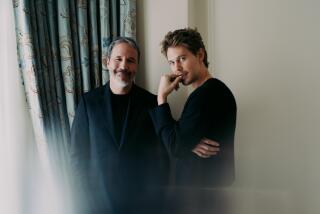Review: Guy Ritchieâs âKing Arthur: Legend of the Swordâ is a head-pounding, nothing-sacred origin story

Justin Chang revews âKing Arthur: Legend of the Swordâ, directed by Guy Ritchie, starring Charlie Hunnam, Ăstrid Bergès-Frisbey, Djimon Hounsou, Jude Law, Eric Bana, Aidan Gillen. Video by Jason H. Neubert
There are some first-rate performances in âKing Arthur: Legend of the Sword,â most of them delivered by computer-generated animals. Eagles swoop down from the sky to fend off hostile armed guards. Venomous snakes swell to Kraken-esque dimensions. Giant elephants stomp into battle and knock down bridges with wrecking balls, which is a pretty good metaphor for director Guy Ritchieâs nothing-sacred approach to Arthurian myth.
Somehow hectic and lumbering, diverting and dispiriting all at once, this mud-toned medieval pulp largely cleaves to the spirit of Ritchieâs âSherlock Holmesâ series, reducing a fabled figure of British lore to two hours of tough-guy swagger and head-pounding digital thwackery. âThis is not your fatherâs King Arthur,â one of the filmâs producers notes in the press materials, to which I would only add that sometimes father knows best.
The movies, of course, would seem to have already exhausted the sheer range of dramatic possibilities where the once and future king is concerned, from the tragic romanticism of âCamelotâ (1967) and the lushly enveloping fantasy of âExcaliburâ (1981) to the dour, unsentimental realism of âKing Arthurâ (2004). I know I said âdramatic possibilities,â but it would be personally disingenuous of me to pretend that Iâve seen a greater Arthurian movie than âMonty Python and the Holy Grail.â
Ritchieâs woefully coconut-free version is more or less what we have come to expect from Hollywood circa 2017 A.D., where every legend can be recast as a superhero and every superhero needs an origin story. This one, as imagined by screenwriters Ritchie, Jody Harold and Lionel Wigram, mostly takes place at a grimly revisionist Camelot where bright colors appear to have been outlawed, Merlin is mentioned but never seen, and Guinevere and Lancelot are at least one putative sequel away.

Charlie Hunnam and Jude Law star in Guy Ritchieâs âKing Arthur: Legend of the Sword.â
When the good King Uther Pendragon (Eric Bana) is betrayed and overthrown by his power-hungry brother Vortigern (Jude Law), Utherâs young son, Arthur, is forced to make like Moses and flee downriver. He winds up in the ancient Roman city of Londinium, where he is raised by prostitutes and becomes a wily street hustler with little memory of his royal roots and no knowledge that he will grow up to be played by a massively ripped Charlie Hunnam.
But thereâs no escaping destiny, and after a few fateful encounters with some Viking mercenaries, a skilled archer named Goosefat Bill (Aidan Gillen) and, inevitably, a sword named Excalibur, our reluctant hero finds himself face-to-face with his evil uncle Vortigern. Fearing the prophecy that he will be usurped by âthe born king,â Vortigern sets out to destroy Arthur and all that he holds dear.
Big mistake, obviously. But then, âKing Arthur: Legend of the Swordâ is nothing if not a paean to obviousness, no matter how many jittery narrative and stylistic fillips Ritchie employs in an attempt to ward off inertia. He is as fond as ever of slowing down and speeding up his action scenes â a gimmicky device that serves only to dilute the movieâs visceral impact, already rendered negligible by a bloodless PG-13 rating. He also likes to cram the frame with secondary characters with memorable names like Bedivere, Wet Stick and Back Lack, none of whom leaves an especially memorable impression.
The directorâs rambunctious style does allow for a few flashes of narrative invention. In one scene, the recounting of a simple chain of events becomes a dementedly intricate he-said, he-said comic routine â the kind of fast-talking sequence that might stir fond memories of âLock, Stock and Two Smoking Barrelsâ and âSnatch,â those peak Ritchie romps from the â90s.
The actors too are fine if uninspired. Hunnam, coming off his career-best work in âThe Lost City of Z,â submits gamely enough to this storyâs clunkier heroics. Itâs a pleasure to see Gillen, if for no other reason than to remind us that a new season of âGame of Thronesâ is just around the corner. Astrid Bergès-Frisbey is suitably bewitching as a benevolent sorceress known as the Mage; she happens to be the only woman in âKing Arthur: Legend of the Swordâ who advances the plot by doing something other than getting stabbed to death, so cheers to her.
Finally, there is Law, who, after two rounds of Dr. Watson duty in Ritchieâs âSherlock Holmesâ movies, seems to be relishing a flamboyantly villainous change of pace. His Vortigern glowers sadistically and has an odd habit of fondling cylindrical objects, whether itâs the base of a hot, dripping candle or the hilt of his weapon. Itâs probably no coincidence that he plots to consolidate his reign by erecting a massive, flaming tower of power, though frankly, if I were the Dark Lord Sauron, Iâd call and demand my eye back.
-----------
âKing Arthur: Legend of the Swordâ
MPAA rating: PG-13, for sequences of violence and action, some suggestive content and brief strong language
Running time: 2 hours, 6 minutes
Playing: In general release

Charlie Hunnam comes to San Diego Comic-Con International to talk about âKing Arthur: Legend of the Sword.â
See the most-read stories in Entertainment this hour Âť
Movie Trailers
ALSO
Guy Ritchie and Jude Law add stylish punch to the legend of King Arthur
âLost City of Zâ actor Charlie Hunnam, reluctant star and existential Hollywood soul
More to Read
Only good movies
Get the Indie Focus newsletter, Mark Olsen's weekly guide to the world of cinema.
You may occasionally receive promotional content from the Los Angeles Times.











